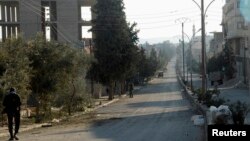Syrian activists say President Bashar al-Assad's forces have regained control of the main highway connecting Damascus to the coast that is needed to extract hundreds of tons of toxic chemicals for destruction.
The Britain-based Syrian Observatory for Human Rights said Monday that government troops seized the towns of Qara and Deir Attiyah and most of the key city of Nabak from rebel fighters along the Damascus-Homs highway.
The north-south road had been closed for nearly 20 days due to the fighting.
The development came as the head of the Organization for the Prohibition of Chemical Weapons said the removal of Syria's chemical arsenal will likely be delayed due to the difficulties of operating during a civil war.
But Ahmet Uzumcu said any hold-up should be small and the mid-2014 deadline to destroy the weapons remains realistic.
The Hague-based OPCW has been charged with supervising the destruction of Syria's chemical arsenal. The most dangerous weapons must be removed by December 31 while those in a second category have to be shipped out by February 5.
Syria has agreed under a deal arranged by the United States and Russia to dismantle its chemical arsenal and destroy all its 1,300 tons of sarin, mustard gas and other lethal agents.
The size of the stockpile, including 800 tons of industrial chemicals destined for incineration at commercial toxic waste plants, means it can only be transported by land and sea using roads linking Damascus to the Mediterranean port of Latakia.
The Britain-based Syrian Observatory for Human Rights said Monday that government troops seized the towns of Qara and Deir Attiyah and most of the key city of Nabak from rebel fighters along the Damascus-Homs highway.
The north-south road had been closed for nearly 20 days due to the fighting.
The development came as the head of the Organization for the Prohibition of Chemical Weapons said the removal of Syria's chemical arsenal will likely be delayed due to the difficulties of operating during a civil war.
But Ahmet Uzumcu said any hold-up should be small and the mid-2014 deadline to destroy the weapons remains realistic.
The Hague-based OPCW has been charged with supervising the destruction of Syria's chemical arsenal. The most dangerous weapons must be removed by December 31 while those in a second category have to be shipped out by February 5.
Syria has agreed under a deal arranged by the United States and Russia to dismantle its chemical arsenal and destroy all its 1,300 tons of sarin, mustard gas and other lethal agents.
The size of the stockpile, including 800 tons of industrial chemicals destined for incineration at commercial toxic waste plants, means it can only be transported by land and sea using roads linking Damascus to the Mediterranean port of Latakia.





